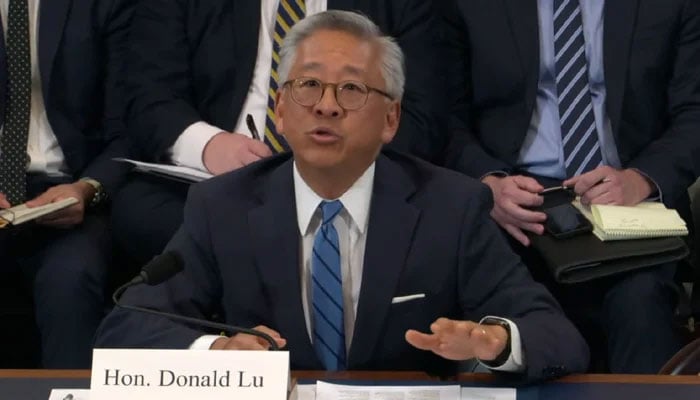‘Very serious’ if Pakistan gets in bed with Iran: Lu
Iran-Pakistan relations, especially in terms of planned gas-pipeline, remained a subject of interest for many members of the congressional panel
WASHINGTON: The Biden administration has set a goal to prevent the construction of Iran-Pakistan gas pipeline while also communicating to Islamabad about its red lines on Tehran’s nuclear proliferation ambitions.
“We have warned them about our red lines, legislative, but also in terms of how we cooperate with Pakistan,” Assistant Secretary of State Donald Lu told the Congressional panel on Wednesday during the hearing on Pakistan.
“If they get in bed with Iran, it will be very serious for our relationship,” Lu said when Congressman Brad Schneider asked about the US messaging about Pakistan’s engagement with Tehran on security matters, especially in the context of mutual concerns of nuclear proliferation in Iran’s nuclear program.
Iran and its relations with Pakistan, especially in terms of the planned gas-pipeline, remained a subject of interest for many members of the congressional panel at the hearing.
The senior State Department diplomat, Lu, told the panel that the administration was tracking the pipeline developments and he fully supports “the efforts by the US government to prevent this pipeline from happening; we are working towards that goal.” He said the administration was in consultation with the Pakistani government on the pipeline issue.
“Honestly, I don’t know where the financing for such a project would come from. I don’t think many international donors would be interested in funding such an endeavour,” he said and pointed out, “We have also not heard from the Government of Pakistan a desire for any waiver of American sanctions that would certainly result from such a project.”
Instead, what we are undertaking in the administration is to have a conversation with Pakistan, Lu said laying out the topics.
“What are Pakistan’s other alternatives? How can we compete for that business? Where can they find other non-Iranian sources of natural gas? How can we help Pakistan think about the transition to clean energy,” he said, adding Pakistan was very interested in providing energy through solar, through wind, through hydro. How can that begin to replace their dependence on coal and other hydrocarbons?
The US also had discussion with the Pakistani government about Afghan deportations. The assistant secretary said over half a million Afghans had returned to Afghanistan following the Pakistani government’s efforts to remove illegal foreigners.
“From the first day of that process, we have been in touch with the Pakistani government both about the humanitarian consequences of this mass deportation but also to try to protect those Afghans who have a pathway to coming to the United States,” Lu said pointing out that there were thousands of Afghans who worked with the Americans and who had fled to Pakistan and sought sanctuary there.
We have been very keen that those Afghans are allowed to stay so we can process them. And the Pakistani government has actually on this one issue been very supportive. We are grateful for that, on the broader issue we’re talking with the new government now about trying to make sure that the rights of Afghan refugees are respected, he said. The assistant secretary acknowledged that the Pakistani people had hosted over 3 million Afghan refugees now for over 40 years. “It is historic in proportion, that sacrifice does not go unnoticed,” he said.
-
 'A Very Special Visitor' Meets Queen Camilla At Clarence House
'A Very Special Visitor' Meets Queen Camilla At Clarence House -
 Jodie Turner Smith Shares One Strict Rule She Follows As A Mom
Jodie Turner Smith Shares One Strict Rule She Follows As A Mom -
 Hailey Bieber Reveals KEY To Balancing Motherhood With Career
Hailey Bieber Reveals KEY To Balancing Motherhood With Career -
 Photo Of Jay-Z, Other Prominent Figures With Jeffrey Epstein Proven To Be Fake
Photo Of Jay-Z, Other Prominent Figures With Jeffrey Epstein Proven To Be Fake -
 Hillary Clinton's Munich Train Video Sparks Conspiracy Theories
Hillary Clinton's Munich Train Video Sparks Conspiracy Theories -
 Fans Slam Talk Show Host For 'cringe' Behavior In Chris Hemsworth Interview
Fans Slam Talk Show Host For 'cringe' Behavior In Chris Hemsworth Interview -
 Woman Jailed Over False 'crime In Space' Claim Against NASA Astronaut
Woman Jailed Over False 'crime In Space' Claim Against NASA Astronaut -
 James Van Der Beek’s Close Pal Reveals Family's Dire Need Of Donations
James Van Der Beek’s Close Pal Reveals Family's Dire Need Of Donations -
 Prince William And Harry's Cousins Attend 'Wuthering Heights' Event
Prince William And Harry's Cousins Attend 'Wuthering Heights' Event -
 Hailey Bieber Turns Heads Just Hours After Major Business Win
Hailey Bieber Turns Heads Just Hours After Major Business Win -
 King Charles' Andrew Decision Labelled 'long Overdue'
King Charles' Andrew Decision Labelled 'long Overdue' -
 Timothee Chalamet 'forever Indebted' To Fan Over Kind Gesture
Timothee Chalamet 'forever Indebted' To Fan Over Kind Gesture -
 Columbia University Sacks Staff Over Epstein Partner's ‘backdoor’ Admission
Columbia University Sacks Staff Over Epstein Partner's ‘backdoor’ Admission -
 Ozzy Osbourne's Family Struggles Behind Closed Doors
Ozzy Osbourne's Family Struggles Behind Closed Doors -
 Dua Lipa Claims Long-distance Relationship 'never Stops Being Hard'
Dua Lipa Claims Long-distance Relationship 'never Stops Being Hard' -
 BTS Moments Of Taylor Swift's 'Opalite' Music Video Unvieled: See Photos
BTS Moments Of Taylor Swift's 'Opalite' Music Video Unvieled: See Photos




